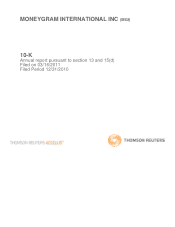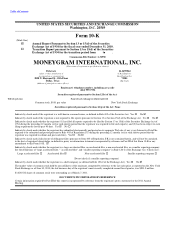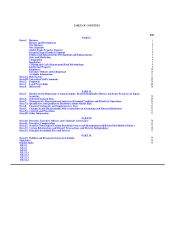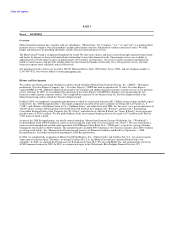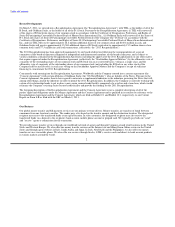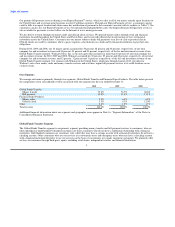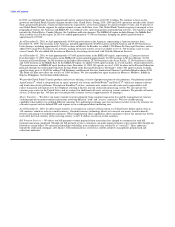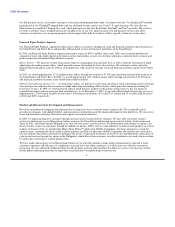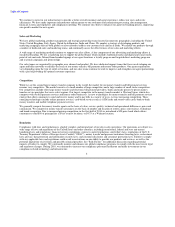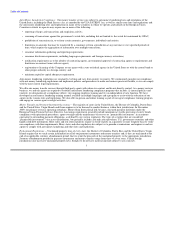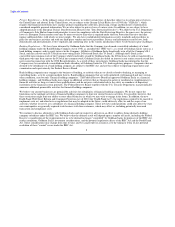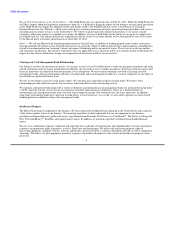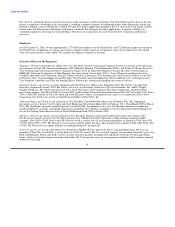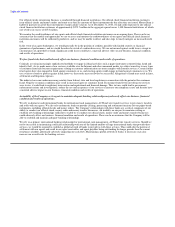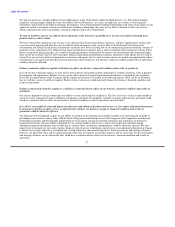MoneyGram 2010 Annual Report Download - page 11
Download and view the complete annual report
Please find page 11 of the 2010 MoneyGram annual report below. You can navigate through the pages in the report by either clicking on the pages listed below, or by using the keyword search tool below to find specific information within the annual report.
Table of Contents
Privacy Regulations — In the ordinary course of our business, we collect certain types of data that subject us to certain privacy laws in
the United States and abroad. In the United States, we are subject to the Gramm-Leach-Bliley Act of 1999 (the "GLB Act"), which
requires that financial institutions have in place policies regarding the collection, processing, storage and disclosure of information
considered nonpublic personal information. We are also subject to privacy laws of various states. In addition, we are subject to laws
adopted pursuant to the European Union's Data Protection Directive (the "Data Protection Directive"). We abide by the U.S. Department
of Commerce's Safe Harbor framework principles to assist in compliance with the Data Protection Directive. In some cases, the privacy
laws of a European Union member state may be more restrictive than what is required under the Data Protection Directive and may
impose additional duties with which we must comply. We also have confidentiality/information security standards and procedures in
place for our business activities and with our third-party vendors and service providers. Privacy and information security laws, both
domestically and internationally, evolve regularly and conflicting laws in the various jurisdictions where we do business pose challenges.
Banking Regulations — We have been informed by Goldman Sachs that the Company was deemed a controlled subsidiary of a bank
holding company under the Bank Holding Company Act of 1956, as amended (the "BHC Act"), as a result of Goldman Sachs' status as a
bank holding company and its equity interest in the Company. Affiliates of Goldman Sachs beneficially own all of the Company's B-1
Stock, and may convert such B-1 Stock into non-voting Series D Preferred Stock (the "D Stock"). Although the D Stock is not
convertible into common stock of the Company while beneficially owned by Goldman Sachs, the D Stock may be sold or transferred to a
third party who may then convert the D Stock into common stock. Goldman Sachs also holds an interest in our senior secured second lien
notes issued in connection with the 2008 Recapitalization. As a result of these investments, Goldman Sachs has informed us that the
Company may be considered a controlled non-bank subsidiary of Goldman Sachs for U.S. bank regulatory purposes. Companies that are
deemed to be subsidiaries of a bank holding company are subject to the BHC Act, and are thus subject to reporting requirements and
examination and supervision by the Federal Reserve Board.
Bank holding companies may engage in the business of banking, or activities that are so closely related to banking, or managing or
controlling banks, as to be a proper incident thereto. Bank holding companies that are well-capitalized, well-managed and meet certain
other conditions, may become "financial holding companies." The Federal Reserve Board has approved Goldman Sachs as a financial
holding company, and Goldman Sachs may engage in additional activities that are financial in nature or incidental or complementary to
financial activities as long as it meets these qualifications, and do not pose a substantial risk to the safety or soundness of depository
institutions or the financial system generally. The Federal Reserve Board, together with the U.S. Treasury Department, may periodically
announce additional permissible activities for financial holding companies.
We believe our current businesses are permissible activities for subsidiaries of financial holding companies. We do not expect the
limitations on the nonbank activities of financial holding companies to limit our current business activities. It is possible, however, that
these restrictions might limit our ability to enter other businesses in which we may wish to engage in the future. In addition, the new
Dodd-Frank Wall Street Reform and Consumer Protection Act of 2010 (the "Dodd-Frank Act"), the regulations required to be enacted to
implement such act, and other laws or regulations that may be adopted in the future, could adversely affect us and the scope of our
activities, whether or not we are a subsidiary of a financial holding company. These new laws and regulations could also affect the ways
our counterparties are generally required to do business with their customers, which may affect us, including potentially increased
transaction and compliance costs.
We continue to discuss alternatives with Goldman Sachs and our respective advisers in an effort to address being deemed a holding
company subsidiary under the BHC Act. We believe that the ultimate result will depend upon a number of factors, including the Federal
Reserve's consideration of the requirements for us to be deemed no longer "controlled" by Goldman Sachs for purposes of the BHC Act,
market conditions, Goldman Sachs' investment considerations, and the potential regulatory effects of the BHC Act and the Dodd-Frank
Act. These considerations may change from time to time, and we can provide no assurance as to the timing or terms of any potential
resolution of these "control" issues under the BHC Act.
8

